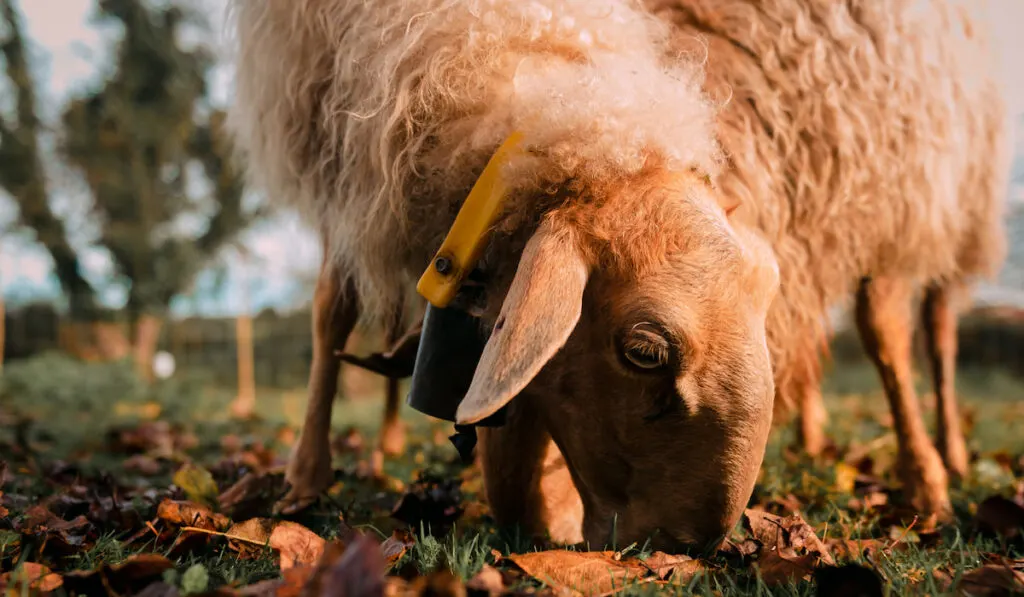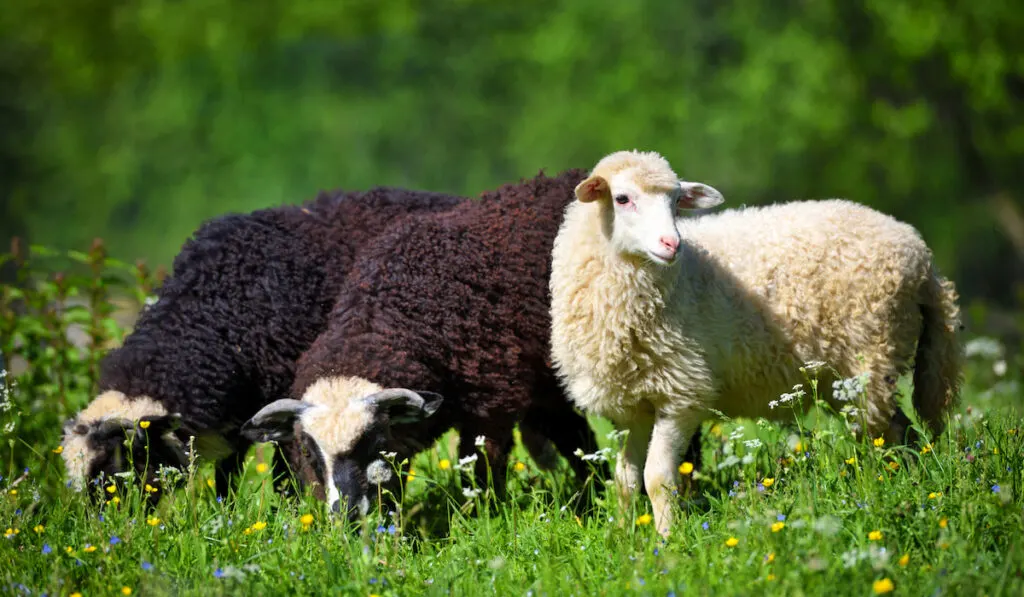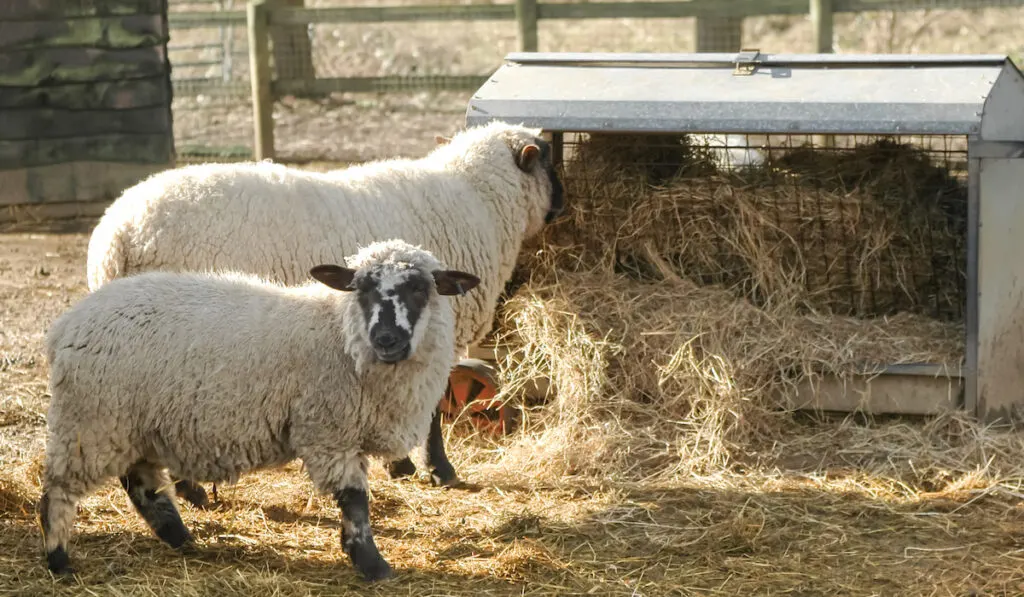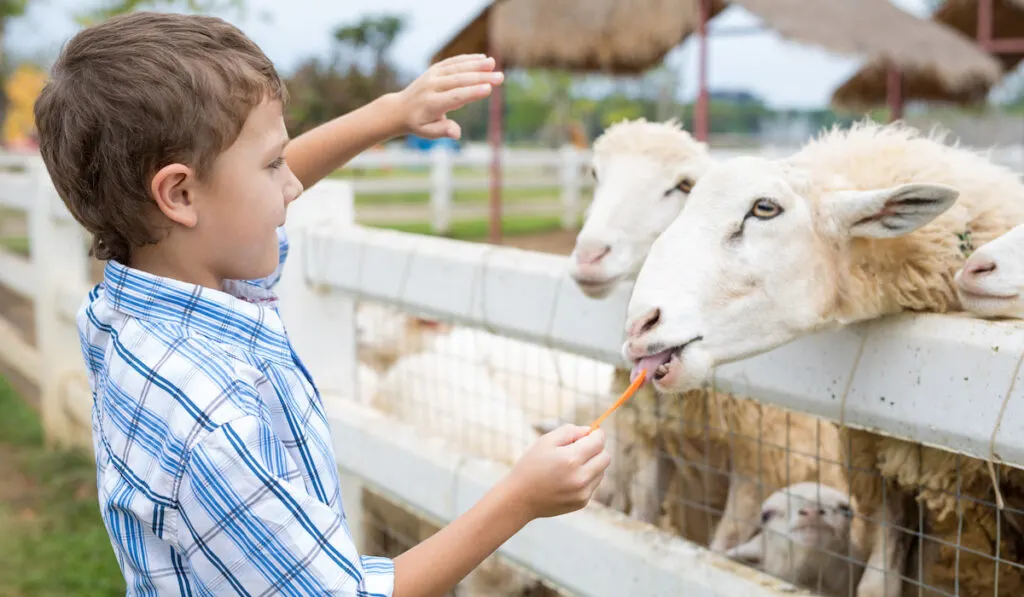Grass can be a rather plentiful feed option especially on a farm or property with a lot of land. You might even have stacks of grass ready to use as feed already. But you raise sheep and are wondering whether it is safe to give this grass to your flock.
Do sheep eat grass?
Sheep can eat grass. They are herbivorous ruminant animals and have both a digestive system and teeth suited for feeding on plants. Sheep are also natural grazers, and their ability to graze is one reason why they are sometimes employed as natural lawnmowers on farms.

If you are looking to feed grass to your sheep, there are proper methods and types of grass to choose from.
In this article, we will share some of the details you need to know before you proactively feed grass to your sheep.
Table of Contents
Do Sheep Eat Grass?
Sheep are natural grazers, and like other animals that belong to this class, they feed mainly on grass, legumes, forbs, clover, hay, and other pastoral plants. On average, they spend 7 hours grazing every day in the period between dawn and early sunset.
Due to their ability to graze and the ease of handling them, sheep are also used on eco-friendly farms as natural lawnmowers. Relative to goats and cattle, they are slower at grazing.
But since they are more selective about their food than goats and they are less aggressive than cattle, more people choose sheep over other animals to cull their lawns.

Types of Grass That Are Best for Sheep
The types of plants sheep eat differs based on their geographical locations. Typically, temperate forages offer sheep more nutrients than tropical forages.
The grasses sheep eat also differ from one place to another. The digestibility, nutrients, and overall benefits of grasses vary with location and time.
All grasses are not the same. If you want to give your sheep the best for grass them, consider the following types:
- Orchard Grass
- Timothy
- Perennial Ryegrass
- Tall Fescue
- Italian Ryegrass
- Kentucky Bluegrass
- Reed Canarygrass
- Smooth Bromegrass
Can You Feed a Sheep Lawn Clippings?
You may have heard you should not give lawn clippings to horses, rabbits, or guinea pigs because they can cause illness. But what about sheep?
Sheep can eat lawn clippings. However, you should only give them freshly mowed or fully fermented lawn clippings.
If you intend to feed grass clippings to your sheep, give them in small amounts as a supplement to their main feed.
Before giving the sheep lawn clippings, ensure that the clippings are not treated with any substance that may be harmful to them.
Do Sheep Pull Grass Out by the Roots?
Sheep do not pull grass out by the roots. Their dentition is designed to allow them to feed on grasses close to the ground without accidentally pulling them out.
Sheep have no teeth in the anterior part of their upper jaw. In its place, they have a hard, fibrous pad. So, they nibble on grasses rather than pull them out by the roots.

Will Sheep Ruin My Lawn?
Sheep will not ruin your lawn, and they are actually better alternatives to chemicals and machines used in lawn mowing.
With the way they feed on forage plants, grazing sheep can help you stop overgrowth and remove weeds that may be harmful to other livestock.
Sheep facilitate nutrient recycling into the soil, and they encourage the growth of healthy forage.
While a sheep will not ruin your lawn, mismanaging them can. To ensure you are managing your sheep the right way and to keep both your sheep and your lawn healthy, consider the following:
- Do not allow more sheep than your lawn can support.
- Move the sheep to a different area when the grass appears half eaten.
- Always let the grass on your lawn grow fully before the sheep graze again.
- Monitor your sheep while they graze on your lawn.
- If you are letting them graze on bluegrass and white clover, you may let your sheep graze until the grasses are very short.
Will Feeding My Sheep Grass Make Them Sick?
Grasses will not make your sheep sick. In fact, they are the best food for your sheep. Grasses have varying quality, and your sheep will do well as long as you feed them with the right type of grass.
You may supplement grasses with other feed but ensure you introduce such feed into their diet gradually.

Tips for Ensuring Your Sheep Get Proper Nutrition
To ensure your sheep get all of the nutrition they need, keep the following tips in mind:
- Introduce new foods or grasses to your sheep’s diet gradually.
- Sheep need energy to grow and carry out all their functions. You need to provide them with food containing starch, fiber, or cellulose. Starch is the richest source of energy, and you can feed your sheep silage, hay, or grains.
- Avoid giving your sheep too much or too little energy food.
- When giving protein to sheep, the quantity is more essential than quality. Protein is particularly important for lactating ewes and growing lambs. Some sources of protein for sheep include soybean meal, cottonseed meal, urea, and fish meal.
- Salt intake is essential in sheep. If they do not get enough, their feed and water intake may fall. Reduced salt intake may also drive your sheep to eat poisonous plants or dirt. You can add 0.5% salt to their complete diet and 1% to a concentrate diet.
- Avoid giving your sheep too much high-grain feed. Such feeds contain high levels of phosphorus and low levels of calcium which can cause a calcium deficiency.
- You should also provide vitamin A, D, E, and K to your sheep. They can get these from plants, grains, fresh feed, and dry feed. Sheep do not need to get B complex vitamins in their diet.
- Provide enough fiber for proper gut functioning. Sheep need about 1 pound of fiber per head daily. They can get fiber from grass, hay, and legumes.
- Make sure your sheep have access to enough fresh water. Sheep need 0.5-4 gallons of water every day. They usually need more water when they consume high levels of protein, salt, or dry matter. Water promotes all the physiological functions of a sheep and reduces the chances of urinary calculi.
Final Thoughts
Sheep can eat grass, and grasses are perhaps one of the best parts of their diet. Grasses come in many qualities, and while sheep can eat any grass, they benefit more from the high-quality varieties.
Resources
- https://byjus.com/biology/digestion-in-ruminants/
- https://www.shepherdsongfarm.com/ecology-grazing-sheep/
- http://www.sheep101.info/eating.html
- https://modernfarmer.com/2014/07/sheep-better-lawn-mowers-goats/
- https://fyi.extension.wisc.edu/forage/pasture-species-selection-for-sheep/
- https://www.lawnstarter.com/blog/lawn-care-2/grass-clippings-sicken-horses-pets-livestock
- https://familyfarmlivestock.com/do-sheep-ruin-pastures/
- https://dpipwe.tas.gov.au/Documents/Sheepfeed.mlc.pdf
- http://www.sheep101.info/201/nutritionreq.html
